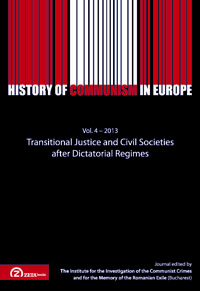Transitional Justice: Between Political Myth and Civil Society Reality
Transitional Justice: Between Political Myth and Civil Society Reality
Author(s): Dalia Agata BathorySubject(s): Philosophy
Published by: Zeta Books
Keywords: transitional justice; political myth; civil society; Latin America; Eastern Europe
Summary/Abstract: Transitional justice emerged as a working concept from the need to clarify the relationship between victims and perpetrators and the latters’ guilt, after the collapse of abusive regimes in Africa, Latin America and Eastern Europe. Since 1995 it has been defined in many ways, by many scholars, according either to its means and goals or to its actors. It has become a very broad concept, describing actions of justice, reparation, search for the truth and reform. While transitional justice policies should result in giving more coherence to a shuttered society, there are at least two threats that must be taken into consideration. One is to transform it into a political myth, by allowing the political factor to confiscate it, the other is to expand its area of concerns in order to cover aspects of daily social problems. The role of the civil society is very important to limit these threats, although what it is that we name “civil society” is still under scholarly debate. The analyses published in this issue of History of Communism in Europe cover these problems in their case studies which come from Latin America or the former Soviet bloc. Most of them stress on the very important role the grassroots actions of members of civil society have on “settling accounts” with the past, actions that seem to be born out of the inefficient “official” measures taken at state level.
Journal: History of Communism in Europe
- Issue Year: 2013
- Issue No: 4
- Page Range: 7-21
- Page Count: 15
- Language: English
- Content File-PDF

